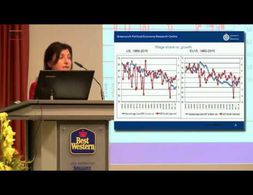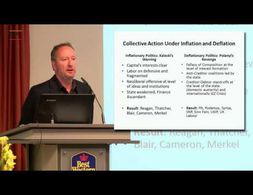✕
9 results
The author identifies three principal economic phenomena, which are explained: long run productivity growth as the central driver of increasing economic activity, short-term and long-term debt cycles. The latter two are explained to some detailed with reference to money creation, central banking and long term crisis tendencies. With regards to the long run debt cycle, which leads into deleveraging and recession, some policy measures which can smoothen the crisis are discussed.
Özlem Onaran analyses the current problems of secular stagnation from a global perspective. At the core of global economic problems is insufficient demand caused by falling wage shares, because most individual countries, and the world as a whole are “wage-led”. Hence a strategy for global growth is to aim at increasing wages and thus the wage share, and the abandonment of policies focusing purely on national competitiveness. Financialization has broken the link between corporate profitability and investment. Reregulation of finance and higher public investment is required in order to crowd in private investment, in this way, reversing the declining trend of potential output growth.
Mark Blyth criticises the political inability to solve the persistent economic crisis in Europe against the background of a deflationary environment. Ideological blockades and impotent institutions are the mutually reinforcing causes of European stagnation. The deeper roots lie in the structural change of the economic system since the 1980s, when neoliberalism emerged as hegemonic ideology. This ideology prepared the ground for austerity and resulting deflationary pressures and a strategy of all seeking to export their way out of trouble. Worryingly this is breeding populist and nationalist resentments in Europe.
In the inspiring interview on Economics of Care, Nancy Foblre takes a closer look to the consequences of the marketization of caring activities on those activities and on the societal organization of care. Folbre elaborates on how to value care and how this shifts the perspectives on living standards. She points to the fact, that caring activities are undervalued both in the market sphere and within the family and thereby questions the division between those spheres. Lastly, Folbre answers the question how to reteach Economics when accounting for caring activities.
Ricardo Hausmann says the new industrial policy is an information revelation process about the state of possibilities, the nature of the obstacles and figuring out whether you can sort out the obstacles so that these new activities can take over.
Have you ever thought about the role of civil society and the evolution of economy in one breath? This one hour long interview of Daron Acemoğlu (MIT) and Martin Wolf (Financial Times) by Rethinking Economy NL gives you much inspiration for it.
The world of economics is changing. Years of turmoil in the global economy mean that nothing will ever be quite the same again. This is the starting point and theme of this radically revised Economist books classic.
Readers of economic and political theory as well as students of economic planning will appreciate this classic, now available for the first time in English. Written eighty years ago, when Sorel became disillusioned with the official socialism of the German and French Marxist parties, this new translation presents Sorel's analysis of the rise and fall of the two great modern ideologies: socialism and liberal capitalism.
In this new book Smith returns to Solow s classic productivity paradox which essentially states that we can see automation everywhere like the spheres of leisure sociality and politics but not in the productivity statistics He examines why labor saving automation in the service age in the Global North has …
We use cookies on our website. Click on Accept to help us to make Exploring Economics constantly better!









